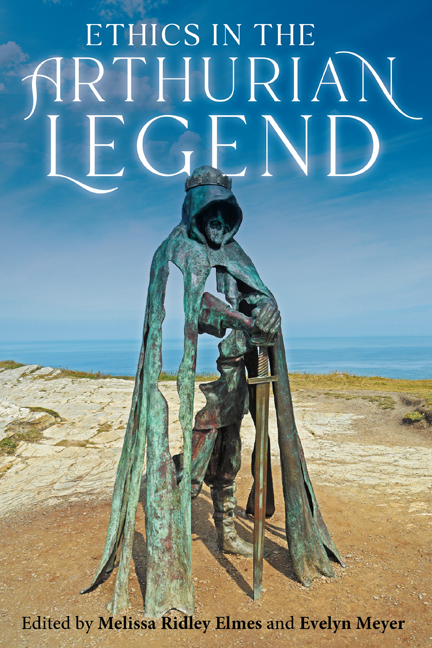Book contents
- Frontmatter
- Contents
- List of Contributors
- Foreword
- Acknowledgments
- Introduction
- 1 Arthurian Ethics before the Pentecostal Oath: In Search of Ethical Origins in Culhwch and Olwen
- 2 Too Quickly or Not Quickly Enough, Too Rash and Too Harshly: The Arthurian Court’s Lack of Ethics in Hartmann von Aue’s Erec and Iwein and Wolfram von Eschenbach’s Parzival
- 3 The Ethics of Arthurian Marriage: Husband vs Wife in Hartmann von Aue’s Iwein
- 4 Arthurian Ethics and Ethical Reading in the Perlesvaus
- 5 Translation Praxis and the Ethical Value of Chivalry in the Caligula Brut
- 6 Imperial Ambitions and the Ethics of Power: Gender, Race, and the Riddarasögur
- 7 Lowland Ethics in the Arthur of the Dutch
- 8 Contesting Royal Power: The Ethics of Good Lordship, Sir Gawain and the Green Knight, and the March of Wales
- 9 “As egir as any lyoun”: The Ethics of Knight-Horse Relationships in Lybeaus Desconus
- 10 Malory’s Ethical Dinadan: Moderate Masculinity in a Crisis of Hypermasculine Chivalry
- 11 Virtus, Vertues, and Gender: Cultivating a Chivalric Habitus in Thomas Malory’s Tale of Sir Gareth
- 12 Kingly Disguise and (Im)Perception in Three Fifteenth- Century English Romances
- 13 “Adventure? What is That?” Arthurian Ethics in/and the Games We Play
- 14 The Ethics of a New Edition of Sir Thomas Malory’s Le Morte Darthur – and More Evidence for the Superiority of the Winchester Manuscript
- 15 The Ethics of Writing Guinevere in Modern Historical Fiction
- Afterword
- Index
7 - Lowland Ethics in the Arthur of the Dutch
Published online by Cambridge University Press: 10 January 2024
- Frontmatter
- Contents
- List of Contributors
- Foreword
- Acknowledgments
- Introduction
- 1 Arthurian Ethics before the Pentecostal Oath: In Search of Ethical Origins in Culhwch and Olwen
- 2 Too Quickly or Not Quickly Enough, Too Rash and Too Harshly: The Arthurian Court’s Lack of Ethics in Hartmann von Aue’s Erec and Iwein and Wolfram von Eschenbach’s Parzival
- 3 The Ethics of Arthurian Marriage: Husband vs Wife in Hartmann von Aue’s Iwein
- 4 Arthurian Ethics and Ethical Reading in the Perlesvaus
- 5 Translation Praxis and the Ethical Value of Chivalry in the Caligula Brut
- 6 Imperial Ambitions and the Ethics of Power: Gender, Race, and the Riddarasögur
- 7 Lowland Ethics in the Arthur of the Dutch
- 8 Contesting Royal Power: The Ethics of Good Lordship, Sir Gawain and the Green Knight, and the March of Wales
- 9 “As egir as any lyoun”: The Ethics of Knight-Horse Relationships in Lybeaus Desconus
- 10 Malory’s Ethical Dinadan: Moderate Masculinity in a Crisis of Hypermasculine Chivalry
- 11 Virtus, Vertues, and Gender: Cultivating a Chivalric Habitus in Thomas Malory’s Tale of Sir Gareth
- 12 Kingly Disguise and (Im)Perception in Three Fifteenth- Century English Romances
- 13 “Adventure? What is That?” Arthurian Ethics in/and the Games We Play
- 14 The Ethics of a New Edition of Sir Thomas Malory’s Le Morte Darthur – and More Evidence for the Superiority of the Winchester Manuscript
- 15 The Ethics of Writing Guinevere in Modern Historical Fiction
- Afterword
- Index
Summary
The larger questions underpinning my contribution to this volume are ones I have no hope of answering adequately in a study of this length: How do we define ethics in the context of Arthurian romance as a genre? How are Arthurian ethics encoded in these texts? Are we looking primarily at morals defined by the Church, or expectations raised by the secular courts, or both? Furthermore, do the ethical conflicts described in this literature differ amongst the many “national traditions”? Do we find, for example, in the English Arthurian romances ethical dilemmas that can in any significant way be distinguished from those in the French, or German, or Italian romances? Any attempt to answer this larger question will have to wait until we possess an overarching, comprehensive map of ethics in Arthurian literature, and that would entail a much more expansive treatment of a large number of passages from the Middle Dutch Arthurian romances. Here, I would like to make a start at exploring the ethics of the Middle Dutch Arthurian corpus based on only a very limited selection of passages.
Before looking at those examples from the Dutch tradition, I want to begin with one of the most famous, explicit codes of ethics in all of Arthurian literature: the Pentecostal Oath appearing in Book III of Malory's Morte Darthur, which Arthur required all of his knights to swear; in Dorrie Armstrong's translation:
Thus, when the quest of the white hart was completed by Sir Gawain, and the quest of the brachet was completed by Sir Tor, King Pellinore's son, and the quest of the lady who was taken away by the knight was completed by King Pellinore, then the king established all his knights, and bestowed on them riches and lands. He charged then never to commit outrage or murder, always to flee treason, and to give mercy to those who asked for mercy, upon pain of the forfeiture of their honor and status as a knight of King Arthur's forever more. He charged them always to help ladies, damsels, gentlewomen, and widows, and never to commit rape, upon pain of death. Also, he commanded that no man should take up a battle in a wrongful quarrel – not for love, nor for any worldly goods.
- Type
- Chapter
- Information
- Ethics in the Arthurian Legend , pp. 151 - 172Publisher: Boydell & BrewerPrint publication year: 2023



